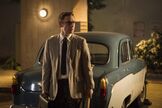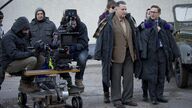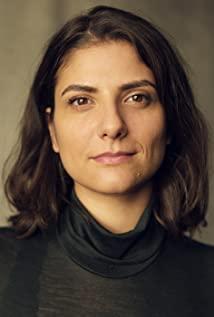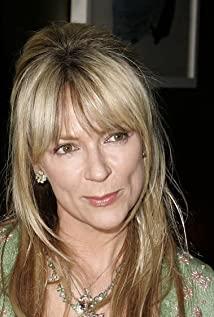If it's a movie, it's really not good. The editing and logic are pretty decent, the subject matter is so good, the emotional control is okay, and the performance is disappointing. Martin Freeman is a monkey-like actor from head to toe, exuding a sense of foolish joy, winking, and thinking, all his performances are just changing expressions. Anthony LaPaglia is what supports the film from his soul to his acting skills. Years of experience in TV dramas have brought him a calm temperament. Unfortunately, it seems to be too far from the original Leo Hurwitz in appearance. I was a little disappointed at the end. The surprise is Rebecca Front, she's never stupid when it comes to comedy, and this time her performance is the most convincing and comfortable role in the whole film.
The camera has been given to Hannah Arendt several times, because she is reading her book "Revolting against "The Evil of Mediocrity", and I have been reading and thinking about "Some Questions in Moral Philosophy" these days. It is a good summary of the first half of the reading.
Leo Hurwitz said to Adolf Eichmann in the camera several times, "Where are you?" The "you" he said should be referring to Eichmann's inner self. "The soul itself sees the soul." When I think, I am my own partner; when I act, I am my own witness. If you lose the ability to talk to yourself, you lose the ability to think. No one could remember things he hadn't figured out in conversations with himself. The problem of memory brings us one small step closer to the nature of evil. Never thinking, never remembering, the greatest evil is not fundamental, but unfounded, because without a foundation, it has no boundaries, so it can reach unthinkable extremes and sweep the world. Eichmann claimed that "he had always lived according to Kant's conception of morality" and "acted in accordance with Kant's obligations", which Arendt finally called "the banality of evil".
As Leo Hurwitz has said several times, anyone can be an Eichmann. His colleagues said he couldn't. I think at this time, everyone really needs to ask themselves, did they really not choose small evil in front of small evil and big evil even once? The real moral problems did not arise with the actions of the Nazis, but with the actions of those who simply "adjusted" themselves and who did not act out of belief. ...not in criminals, but in ordinary people, morality disintegrates into a set of isolated customs - styles, customs, traditions that can be changed at will... When history declares Hitler's criminal morality a failure, these morals immediately Turned upside down again... We must say that we have not once, but twice, witnessed a complete breakdown of the "moral" order.
Reading Arendt every day brings me shock and helplessness again and again. And these are all things that can't be brought in the film, except for the video clip of the extermination of Jews being shown to Eichmann, those real images, these things actually happened. And Eichmann remained expressionless. I don't know if Arendt has communicated with Hurwitz, but Hurwitz in the film has become Arendt's spokesperson, which makes people wonder if these ideas of his have been poured into his documentary, It was also absorbed by Arendt.
Arendt left Germany, but never gave up German, "If I did consciously do anything for European civilization, it must have been no more than a decision, since fleeing Germany, to never give me any Or another language imposed on me in exchange for my mother tongue. … mother tongue is always the only reliable yardstick against which other languages are acquired..." Rewatched "Woman in Gold-2015" the other day, escaping Maria Altmann of Austria returned to her homeland, but chose to stick to English because the damage caused by the war had not been repaid. She said, "Restitution-the return of something to its original state... At the very least, we should be reunited with what is rightfully ours." Lin Taiyi said, of course, the homeland cannot be returned, time changes, not to mention Experienced the worst looting in human history?
If you recall "The Reader-2008" again, Hanna Schmitz is an ordinary person in Arendt's "banal evil", who has lost the ability to talk to herself, lose the ability to think, and lose her memory. When she questioned the judge, she really couldn't figure it out, and this sentence was asked of all survivors, even all those born after the war. "Conversation with dialegesthai, thinking is dianoeisthai, thinking is a silent dialogue between oneself and oneself, and finally I finally want to understand one thing to think a matter through", one day, when I finally understand it clearly, I finally reach an agreement with myself, however, for once Can you really live with yourself like this? So Hannah chose to commit suicide.
It is better to suffer injustice than to do injustice, and it is better for me to contradict myself as a person, to contradict the whole world.
I probably won't be able to figure it out in my entire life, and even if I finally figure it out, maybe I won't be able to.
View more about The Eichmann Show reviews











